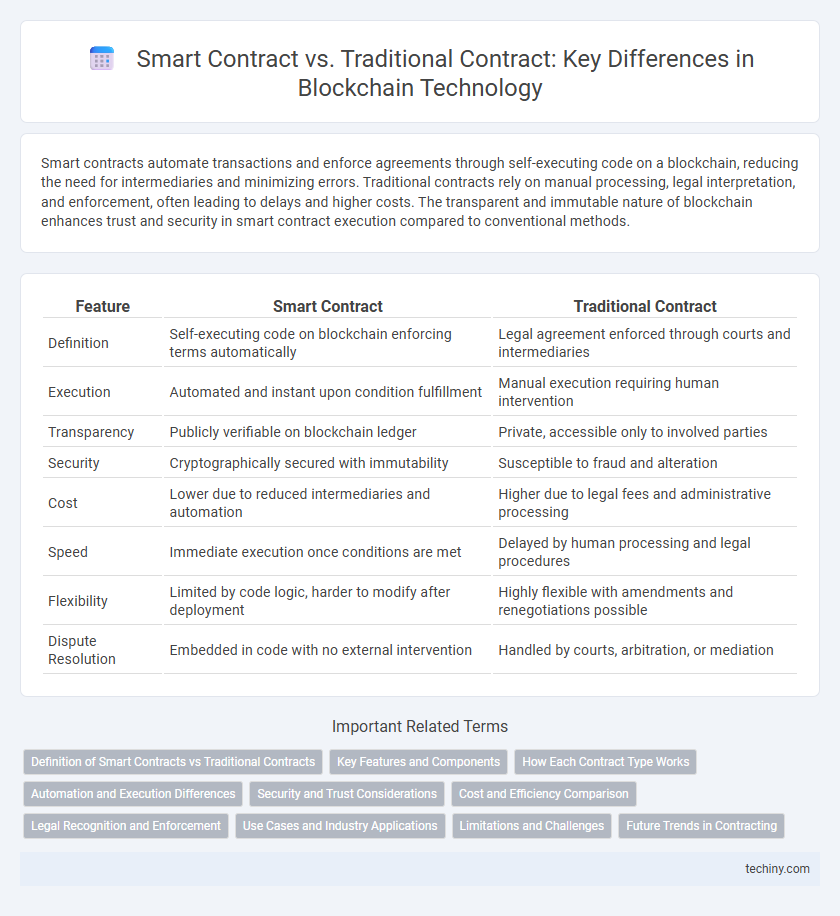Smart contracts automate transactions and enforce agreements through self-executing code on a blockchain, reducing the need for intermediaries and minimizing errors. Traditional contracts rely on manual processing, legal interpretation, and enforcement, often leading to delays and higher costs. The transparent and immutable nature of blockchain enhances trust and security in smart contract execution compared to conventional methods.
Table of Comparison
| Feature | Smart Contract | Traditional Contract |
|---|---|---|
| Definition | Self-executing code on blockchain enforcing terms automatically | Legal agreement enforced through courts and intermediaries |
| Execution | Automated and instant upon condition fulfillment | Manual execution requiring human intervention |
| Transparency | Publicly verifiable on blockchain ledger | Private, accessible only to involved parties |
| Security | Cryptographically secured with immutability | Susceptible to fraud and alteration |
| Cost | Lower due to reduced intermediaries and automation | Higher due to legal fees and administrative processing |
| Speed | Immediate execution once conditions are met | Delayed by human processing and legal procedures |
| Flexibility | Limited by code logic, harder to modify after deployment | Highly flexible with amendments and renegotiations possible |
| Dispute Resolution | Embedded in code with no external intervention | Handled by courts, arbitration, or mediation |
Definition of Smart Contracts vs Traditional Contracts
Smart contracts are self-executing agreements with terms directly written into code on a blockchain, enabling automatic enforcement and validation without intermediaries. Traditional contracts are legally binding agreements documented on paper or digitally, requiring manual enforcement and often reliant on legal systems for dispute resolution. Blockchain technology ensures smart contracts operate transparently, securely, and immutably, contrasting the potential for human error and delays in traditional contracts.
Key Features and Components
Smart contracts automate execution through self-executing code stored on blockchain, ensuring tamper-proof, transparent, and trustless transactions without intermediaries. Traditional contracts rely on legally binding written agreements enforced by courts, often requiring manual validation and third-party involvement. Key components of smart contracts include code logic, digital signatures, and blockchain consensus mechanisms, whereas traditional contracts depend on legal language, witness signatures, and regulatory frameworks.
How Each Contract Type Works
Smart contracts operate through code executed on blockchain networks, automatically enforcing terms based on predefined conditions without intermediaries, ensuring transparency and immutability. Traditional contracts rely on legal language, manual enforcement, and third-party authorities such as courts or lawyers to interpret and uphold agreements. Blockchain technology enables smart contracts to execute transactions instantly and securely, contrasting with the time-consuming and error-prone processes associated with traditional contracts.
Automation and Execution Differences
Smart contracts on blockchain automate execution through self-executing code that enforces agreement terms without intermediaries, ensuring speed and accuracy. Traditional contracts require manual processing, legal oversight, and enforcement, which introduces delays and potential human error. The automation in smart contracts guarantees transparent, immutable, and instant fulfillment of contractual obligations.
Security and Trust Considerations
Smart contracts leverage blockchain's decentralized architecture to enhance security by eliminating intermediaries and reducing the risk of fraud or manipulation inherent in traditional contracts. The cryptographic algorithms and consensus mechanisms ensure immutability and transparency, fostering a higher level of trust among parties. In contrast, traditional contracts rely heavily on legal enforcement and trusted third parties, exposing them to higher vulnerabilities in tampering and dispute resolution.
Cost and Efficiency Comparison
Smart contracts drastically reduce costs by automating contract execution and eliminating intermediaries, unlike traditional contracts that rely on manual processing and legal fees. Efficiency improves as smart contracts enable instant, transparent transactions on blockchain networks, minimizing delays prevalent in traditional contract enforcement. This automation and transparency significantly accelerate contract fulfillment while maintaining security and immutability.
Legal Recognition and Enforcement
Smart contracts offer automated execution and tamper-resistant records, providing enhanced transparency and efficiency compared to traditional contracts. Legal recognition of smart contracts varies by jurisdiction, with some countries enacting specific laws validating their enforceability, while others still rely on conventional contract principles. Enforcement challenges include the need for interoperable legal frameworks and technological literacy among legal professionals to bridge gaps between code-based agreements and judicial processes.
Use Cases and Industry Applications
Smart contracts automate and enforce agreements through blockchain technology, reducing the need for intermediaries and enhancing transparency in industries like finance, supply chain, and real estate. Traditional contracts dominate legal and business frameworks but often involve manual processes, delayed execution, and increased risk of disputes. Use cases for smart contracts include decentralized finance (DeFi) platforms, automated insurance claims processing, and secure asset transfer, while traditional contracts remain prevalent in courts, regulatory compliance, and complex negotiations requiring human judgment.
Limitations and Challenges
Smart contracts face limitations such as code immutability, which makes correcting bugs or adapting terms difficult compared to traditional contract amendments. They require a high level of technical expertise for development and auditing, increasing the risk of vulnerabilities and security breaches. Traditional contracts offer flexibility through legal interpretation and dispute resolution mechanisms that smart contracts currently lack.
Future Trends in Contracting
Smart contracts are revolutionizing the future of contracting by enabling automated, transparent, and tamper-proof agreements executed on blockchain networks. Unlike traditional contracts, these digital agreements reduce the need for intermediaries, lower transaction costs, and facilitate real-time compliance monitoring. Emerging trends include the integration of artificial intelligence for dynamic contract management and the adoption of cross-chain interoperability to enhance scalability and functionality.
smart contract vs traditional contract Infographic

 techiny.com
techiny.com